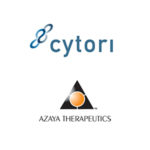 Cytori Therapeutics (NSDQ:CYTX) said this week that it bought San Antonio-based Azaya Therapeutics and its nanoparticle cancer drugs in a stock deal. Azaya shareholders will receive $2 million in CTYX stock.
Cytori Therapeutics (NSDQ:CYTX) said this week that it bought San Antonio-based Azaya Therapeutics and its nanoparticle cancer drugs in a stock deal. Azaya shareholders will receive $2 million in CTYX stock.
San Diego-based Cytori will also pay $2 million upfront for costs associated with Azaya’s new manufacturing facility in San Antonio.
Cytori will acquire a pair of experimental cancer drugs, ATI-0918 and ATI-1123, which were designed to deliver chemotherapies more effectively and with fewer side effects than traditional formulations. ATI-0918 is a generic version of doxorubicin, but Azaya has not yet proven that the drug is bioequivalent in the U.S. Instead, it completed a trial in Europe and said it plans to file for regulatory approval in 2018. The company also said that it hopes to pursue a follow-on study in the U.S. for ATI-0918.
The company’s 2nd drug candidate, ATI-1123, is a nanoparticle-stabilized liposomal formulation of the widely-used chemotherapy, docetaxel. The candidate completed phase I testing in patients with solid tumor cancers.
“Azaya’s technology and intellectual property present an exciting opportunity to marry Cytori’s cell therapy technology, which is currently in late-stage clinical trials, to a clinically proven and patented off-the-shelf pharmaceutical delivery system directly applicable to regenerative medicine,” Cytori president & CEO Dr. Marc Hedrick said in prepared remarks. “We are working diligently with Azaya to consummate the acquisition so that we can exploit the inherent unique synergies that are present and which we believe will allow Cytori to leap forward in its intended development of next-generation, ‘druggable’ regenerative medicine products. In addition, the acquisition allows Cytori to cost-effectively expand our clinical pipeline with two promising oncology drugs that potentially have sizable, near-term, global licensing and revenue opportunities.”
“The proposed transaction with Cytori will put Azaya and its stockholders in a position to benefit from potential global commercialization of our ATI-0918 generic liposomal doxorubicin product that has been shown to be bioequivalent to Johnson & Johnson’s branded product in Europe, as well as further the clinical development of ATI-1123, our proprietary liposomal encapsulated docetaxel,” Azaya’s chairman John Kerr added. “In addition, this transaction provides Azaya’s stockholders, through Azaya’s ownership of Cytori shares, the ability to participate in any future success of Cytori’s regenerative medicine portfolio.”
Last October, Cytori touted the publication of preclinical safety and efficacy data for its cell therapy treatment for combined radiation and thermal injury.
Cytori’s cell therapy is derived from human adipose tissue, or fat, and is also known as adipose-derived regenerative cells. Because the regenerative cells come from the patient’s body, treatment with these cells avoid cell rejection and do not require immunosuppressive drugs. Previous studies have shown that the cells can promote angiogenesis – the creation of new blood vessels from pre-existing vessels. Preclinical studies also demonstrated that the regenerative cells are associated with wound healing, promoting the expression of extracellular matrix components and remodeling enzymes.
The study, published in the International Journal of Radiation Biology, evaluated local and intravenous administration of the cell therapy to burns that were compromised by exposure to marrow-damaging total body irradiation. Two weeks after treatment, the treated wounds had 3.5 times greater re-epitheliazation and a 67% increase in blood vessel density on average. The treated wounds also saw a 30% increase in collagen deposition. The therapy was well tolerated and no serious side effects were observed over the course of the study.

